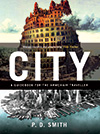The last few days have been pleasantly busy with interviews and reviews of City. I was on Sean Moncrieff's show last Monday and talked to Robert Elms at BBC London on Wednesday. Robert really loves cities, especially London of course, so that was great fun. Yesterday I talked to Rob Ferrett at Wisconsin Public Radio. It was a wide-ranging discussion about some of my favourite cities throughout history. We talked for about an hour and took calls from listeners, including one who had been to Timbuktu. You can download the programme here.
A piece by me that appeared in last month's Architecture Today on "My Kind of Town" is now online. I cheated a bit and created a composite of those aspects of cities that have most impressed me, from the garden squares of Bloomsbury, the evocative history of Rome, and the friendliness and efficiency of Tokyo, to the dynamic diversity of New York City. Read it here.
This weekend there was a good review of City in The Economist. Here's an extract:
Mr Smith has written an unapologetic paean, not to any particular city but to the urban idea in general. Not for Mr Smith the lazy myths of a lost, rural golden age, to which many city-dwellers are prone to succumb after a day spent negotiating the noise, traffic and smog of their man-made environments... The city is the building block of civilisation and of almost everything people do; a guidebook to the city is really, therefore, a guidebook to how a large and ever-growing chunk of humanity chooses to live. Mr Smith’s book serves as an excellent introduction to a vast subject, and will suggest plenty of further lines of inquiry.
The full review is online here. Yesterday I found out that City had also been reviewed in the current issue of The New Yorker. Being reviewed by The New Yorker is a new experience for me, so that was really exciting. It's not online but I don't suppose they will mind too much if I share it with you:
This “guidebook for the urban age” ranges from the Mesopotamian cities of Eridu and Ur to the unbuilt cities of the future, which may or may not feature smart electricity grids, rent-by-the-hour “love hotels,” and “skyscraper farms” housing chicken and fish that feed on the waste from hydroponic crops. Short chapters cover such subjects as parks, train stations, department stores, hotels, graffiti, gentrification, parking meters, street food, cemeteries, and ruins. Smith’s enthusiasm for cities sometimes lapses in a generic boosterism that whitewashes their more pernicious aspects. But the book’s hodgepodge structure excitingly mirrors the improvised order of cities themselves, and Smith encourages his readers to “wander and drift,” a strategy liable to generate surprising juxtapositions – as between urban birds, which sing at a higher pitch than birds in the country, and the police drones that fly above the streets of Liverpool.


